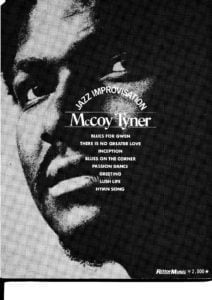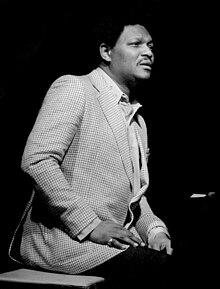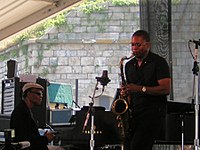Browse in the Library:
Search Posts by Categories:
Wondrous: McCoy Tyner / George Coleman Quartet – Jazzfestival Bern 1998
Jazz Sheet music available from our Library.
Browse in the Library:

● Tracklist:
1. I’ll Take Romance 2. What Is This Thing Called Love 3. Blues On The Corner 4. For All We Know 5. In A Sentimental Mood 6. The Night Has A Thousand Eyes . . . encore 7. Blue Monk
● Personnel:
McCoy Tyner – piano George Coleman – tenor sax Avery Sharpe – bass Aaron Scott – drums – McCoy Tyner / George Coleman Quartet
● Recorded at:
Jazzfestival Bern 1998 Live at 23. Internationales Jazzfestival Bern, Switzerland, May 10, 1998
McCoy Tyner
Alfred McCoy Tyner (December 11, 1938 – March 6, 2020) was an American jazz pianist known for his work with the John Coltrane Quartet and a long solo career. He was an NEA Jazz Master and a five-time Grammy winner. Not a player of electric keyboards and synthesizers, he was committed to acoustic instrumentation. Tyner, who was widely imitated, was one of the most recognizable and most influential pianists in jazz history.
In 1960, Tyner joined The Jazztet led by Benny Golson and Art Farmer. Six months later, he joined the quartet of John Coltrane that included Elvin Jones and Steve Davis (later replaced by Art Davis, Reggie Workman, and, finally, Jimmy Garrison). He worked with the band during its extended run at the Jazz Gallery, replacing Steve Kuhn.
Coltrane had known Tyner for a while growing up in Philadelphia. He recorded the pianist’s composition “The Believer” on January 10, 1958; it became the title track of Prestige’s 1964 album The Believer issued as a John Coltrane record. He played on Coltrane’s My Favorite Things (1961) for Atlantic. The band toured almost non-stop between 1961 and 1965, recording the albums Coltrane “Live” at the Village Vanguard (1962), Ballads (1963), John Coltrane and Johnny Hartman (1963), Live at Birdland (1964), Crescent (1964), A Love Supreme (1964), and The John Coltrane Quartet Plays (1965), all for Impulse! Records.
While in Coltrane’s group, he recorded albums in a piano trio. In late 1962 and the first half of 1963, Tyner was asked by producer Bob Thiele to record more straightforward jazz albums as a leader. These albums included Reaching Fourth (1963), Today and Tomorrow (1964), and McCoy Tyner Plays Ellington (1965). Reviewing the album in 2017, Marc Myers of JazzWax said, “…the finest of these straightforward piano recordings was Nights of Ballads & Blues. Tyner’s playing is exciting and exceptional on all of the tracks…
On the album, he exhibits a reserved elegance and tenderness that reveals the other side of his personality—a lover of melody and standards. In this regard, there are traces of Oscar Peterson in his playing. Perhaps Thiele was using Tyner to take a bite out of Peterson’s vast and successful early-’60s share of the jazz market. Tyner also appeared as a sideman on many Blue Note albums of the 1960s, although he was often credited as “etc.” on the cover of these albums to respect his contract with Impulse!.
Tyner’s playing style developed in close contact with Coltrane. His style of piano is comparable to Coltrane’s maximalist style on saxophone.Writing in 2019, Sami Linna at the University of the Arts Helsinki noted that Coltrane described the two different directions in his playing as: “playing chordally (vertically) or melodically (horizontally)”. Linna suggests: “Tyner would eventually find a way of dealing with the two directions simultaneously, in a manner that was supportive and complementary yet original and slightly different from Coltrane’s approach.” After 1960 Coltrane did not hire anyone at the piano if Tyner was not available; between Tyner joining the group (around the end of May 1960) and leaving (in December 1965), there was nobody else at the piano accompanying Coltrane.

Tyner’s involvement with Coltrane came to an end in 1965. Coltrane’s music was becoming much more atonal and free; he had also augmented his quartet with percussion players who threatened to drown out both Tyner and Jones: “I didn’t see myself making any contribution to that music… All I could hear was a lot of noise. I didn’t have any feeling for the music, and when I don’t have feelings, I don’t play”. In 1966, Tyner rehearsed with a new trio and embarked on a career as a bandleader.
After leaving Coltrane’s group, Tyner produced a series of post-bop albums released by Blue Note from 1967 to 1970. These included The Real McCoy (1967), Tender Moments (1967), Time for Tyner (1968), Expansions (1968) and Extensions (1970). He signed with Milestone and recorded such albums as Sahara and Echoes of a Friend (1972), Enlightenment (1973), and Fly with the Wind (1976), which included flautist Hubert Laws, drummer Billy Cobham, and a string orchestra.
His music for Blue Note and Milestone often took the music of the Coltrane quartet as a starting point. Tyner also incorporated African and East Asian elements in his music. On Sahara he played koto in addition to piano, flute, and percussion. These albums have been cited as examples of innovative jazz from the 1970s that was neither fusion nor free jazz. On Trident (1975) Tyner played the harpsichord and celeste, instruments heard rarely in jazz.

During the 1980s and 1990s, Tyner worked in a trio that included Avery Sharpe on bass and Louis Hayes, then Aaron Scott, on drums.He made solo albums for Blue Note, starting with Revelations (1988) and culminating in Soliloquy (1991). After signing with Telarc, he recorded with several trios that included Charnett Moffett on bass and Al Foster on drums. In 2008, he toured with a quartet of Gary Bartz, Gerald L. Cannon, and Eric Gravatt.
McCoy Tyner was among hundreds of artists whose material was reportedly destroyed in the 2008 Universal fire.
Tyner is considered to be one of the most influential jazz pianists of the late 20th century, an honor he earned during and after his time with Coltrane.

Tyner, who was left-handed, played with a low bass left hand and he raised his arm high above the keyboard for an emphatic attack. His right-hand soloing was detached and staccato. His melodic vocabulary was rich, ranging from raw blues to complexly superimposed pentatonic scales; his approach to chord voicing (most characteristically by fourths) influenced contemporary jazz pianists, such as Chick Corea.
Tyner was named a 2002 NEA Jazz Master by the National Endowment for the Arts. He won five Grammy Awards, for The Turning Point and Journey and best instrumental jazz album for Illuminations, Infinity, and Blues for Coltrane: A Tribute to John Coltrane.
Tyner was awarded an Honorary Doctorate of Music from Berklee College of Music at the Sala dei Notari during the Umbria Jazz Festival. Tyner was a judge for the 6th, 10th and 11th annual Independent Music Awards (IMAs).
George Coleman
George Edward Coleman (born March 8, 1935) is an American jazz saxophonist known for his work with Miles Davis and Herbie Hancock in the 1960s. In 2015, he was named an NEA Jazz Master.
After working with Ray Charles, Coleman started working with B.B. King in 1953, at which point he switched to tenor saxophone. In 1956 Coleman moved to Chicago, along with Booker Little, where he worked with Gene Ammons and Johnny Griffin before joining Max Roach‘s quintet (1958–1959). Coleman recorded with organist Jimmy Smith on his album House Party (1957), along with Lee Morgan, Curtis Fuller, Kenny Burrell, and Donald Bailey. Moving to New York City with Max Roach in that year, he went on to play with Slide Hampton (1959–1962), Ron Carter, Jimmy Cobb, and Wild Bill Davis (1962), before joining Miles Davis’ quintet in 1963–1964.
His albums with Davis (and the rhythm section of Herbie Hancock (piano), Ron Carter (bass), and Tony Williams (drums)) are Seven Steps to Heaven (1963), A Rare Home Town Appearance (1963), Côte Blues (1963), In Europe (1963), My Funny Valentine, and Four & More, both live recordings of a concert in Lincoln Center for the Performing Arts in New York City in February 1964. Shortly after this concert, Coleman was replaced by Wayne Shorter. Nevertheless, Davis retained a high opinion of Coleman’s playing, stating that “George played everything almost perfectly…He was a hell of a musician.”
Coleman played with Lionel Hampton (1965–1966), also in 1965 on Chet Baker‘s The Prestige Sessions, with Kirk Lightsey, Herman Wright, and Roy Brooks. Clark Terry, Horace Silver, Elvin Jones (1968), Shirley Scott (1972), Cedar Walton (1975), Charles Mingus (1977–1978), Ahmad Jamal (1994, 2000), and many others.
Coleman also appeared in the science-fiction film Freejack (1992), starring Emilio Estevez, Mick Jagger, and Anthony Hopkins; and 1996’s The Preacher’s Wife, with Denzel Washington and Whitney Houston.
Coleman recorded into the 2000s. His CD as co-leader, Four Generations of Miles: A Live Tribute To Miles, with bassist Ron Carter, drummer Jimmy Cobb and guitarist Mike Stern was released on Chesky Records in October 2002, and it concentrates on the 1960s working repertoire of Miles Davis. Tracks include: “There Is No Greater Love“, “All Blues“, “On Green Dolphin Street“, “Blue in Green“, “81”, “Freddie Freeloader“, “My Funny Valentine“, “If I Were a Bell”, and “Oleo“. He was featured on Joey DeFrancesco‘s 2006 release Organic Vibes, along with vibraphonist Bobby Hutcherson, Billboard’s Top Jazz Album Chart, peaked to No. 17.
Coleman was married to jazz organist Gloria Coleman. They had two children, including jazz drummer George Coleman Jr., and divorced.
He was named an NEA Jazz Master and to the Memphis Music Hall of Fame in 2015, and received a brass note on the Beale Street Brass Notes Walk of Fame.
